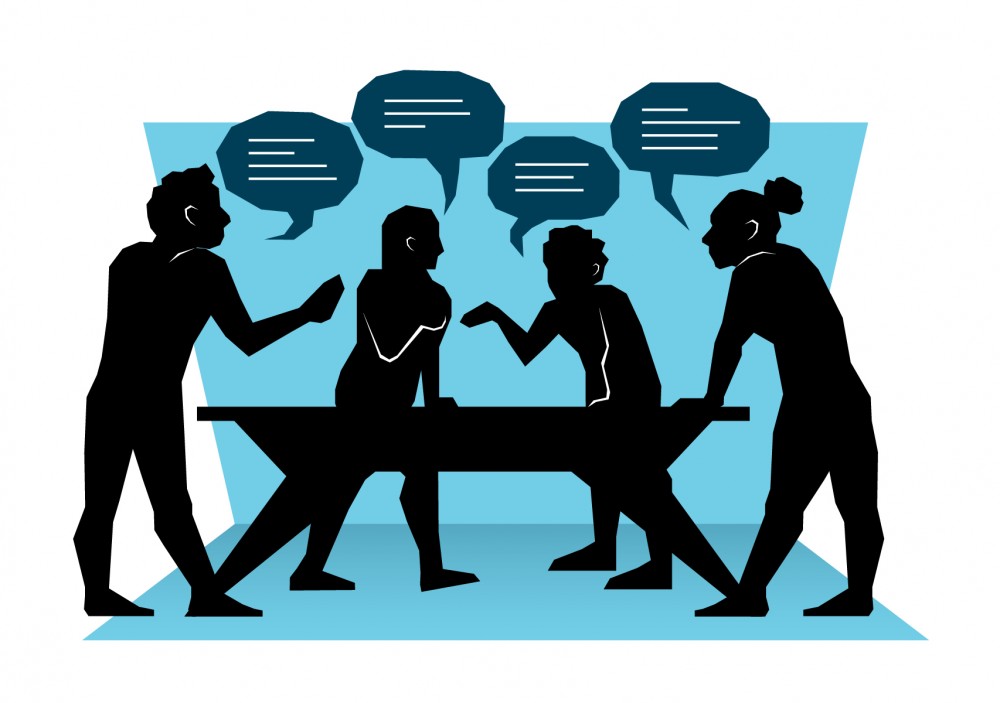Can a Black Person Be Racist Against a White Person
Editorial: Can white people experience racism? Pt. 2
An caption of why white people cannot experience racism.

Hailee Schievelbein
This editorial was written as a follow-up to a previous editorial board piece . "Opposite racism" is what a white person may utilize to describe a conventionalities that any social or economic gains by Blackness people somehow undermine the white experience. That by refusing to remain dormant while racial injustice still defines our land, Black people'southward determination not to comply with those racially exploitative conventions is the same as the racism exercised by white people for hundreds of years. Any grouping of people can feel racial prejudice or bigotry. However, racism refers to that prejudice in addition to the socialized power structures at play. And then, not everyone can feel the racism that Black people do because the power dynamic that has existed since the Atlantic Slave Trade is but non equivalent to any other racial experience in the States. The idea of "reverse racism" ignores the basic reality of who holds more than power and privilege by bold that everyone starts off on an even playing field. Its premise completely disregards whatsoever of the overwhelming bear witness of institutionalized racism. For example, "reverse racism" is often cited as the reason for complaints about affirmative action, that white students "lose their seats" in favor of a educatee of color in society to fulfill a quota. In reality, affirmative action programs were put in place in gild to mitigate the results of institutionalized racism, and they work to establish guidelines that detect qualified applicants, regardless of their socioeconomic status, race or gender. Affirmative activeness started with President Lyndon B. Johnson's Executive Club 11246 in 1965 for hiring practices in regime contractors and subcontractors, and further legislation slowly continued since. The idea that a white student is inherently smarter than a student of color, or inherently a better fit for a school or program, not merely exposes a reality of institutionalized racism — that white students might be more than prepared for a schoolhouse because they've had the resources and time to ready them for it — but also shows the blazon of thought that stems from white privilege. At that place isn't one widely accepted definition of white privilege, but organizational consultant Frances Due east. Kendall calls it "having greater admission to power and resource than people of colour [in the aforementioned situation] practice." With white privilege comes the "ability of normal," or the power that comes with everything catered to benefit white people. This allows them to motility through the world expecting, realistically, every need to be met. This privilege ways that white people are more likely to be treated as individuals rather than representatives for a whole group of people or exceptions to racial stereotypes. It also means that white people are less likely to be stopped by law enforcement for "looking suspicious," less likely to be questioned about financial responsibleness and less probable to exist imprisoned for possession of marijuana. White people do good from this racist arrangement, and they always have. They tin can live comfortably while people are harmed and discriminated confronting because of the color of their skin, and this complicity is why Robin DiAngelo, author of "White Fragility," claims that all white people are inherently racist. They can be overnice, yeah, and abet to terminate racial injustice, but information technology is only with the dismantling of the centuries-former institutions that run this land tin a ameliorate hereafter exist built: one that isn't built from slavery and prejudice. If y'all are white, don't permit the thought that you are inherently racist because of the system you benefit from make you biting and defensive. The but way to face this problem is to fight it head-on. In that location is no more time tacitly to ignore the tentacles of institutionalized racism that achieve every corner of American life. Resources to farther read up on these topics: "What is White Privilege, Really?" by Cory Collins "Reverse Racism is a Myth" courtesy of the Alberta Ceremonious Liberties Research Centre "'In that location is No Neutral': 'Nice White People' Can Still be Complicit in a Racist Club" by Ari Shapiro "Can White People Feel Racism?" by Natalie Morris "The Myth of Reverse Racism" by Vann R. Newkirk Two
Source: https://mndaily.com/233763/opinion/op-reverseracism2/
0 Response to "Can a Black Person Be Racist Against a White Person"
Enregistrer un commentaire